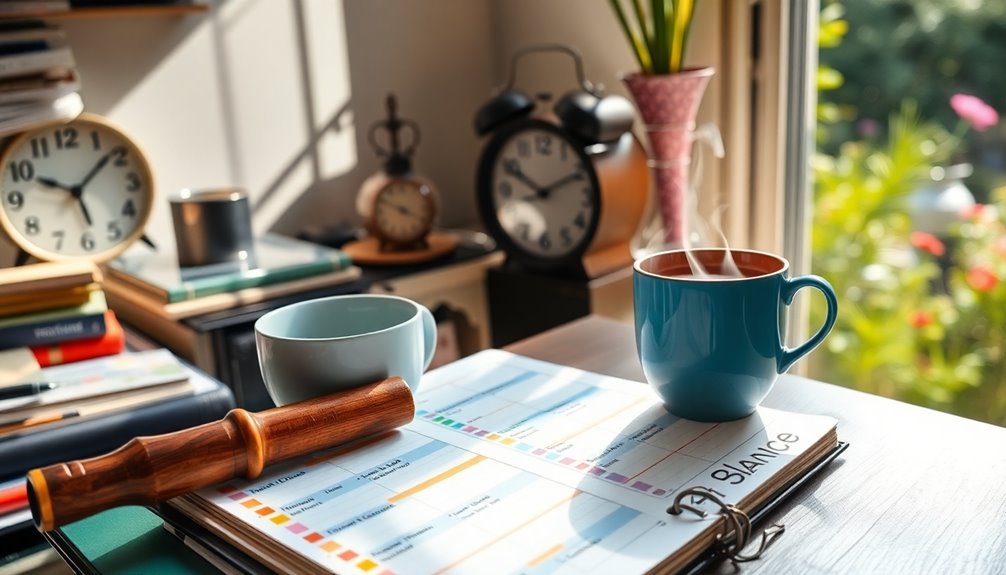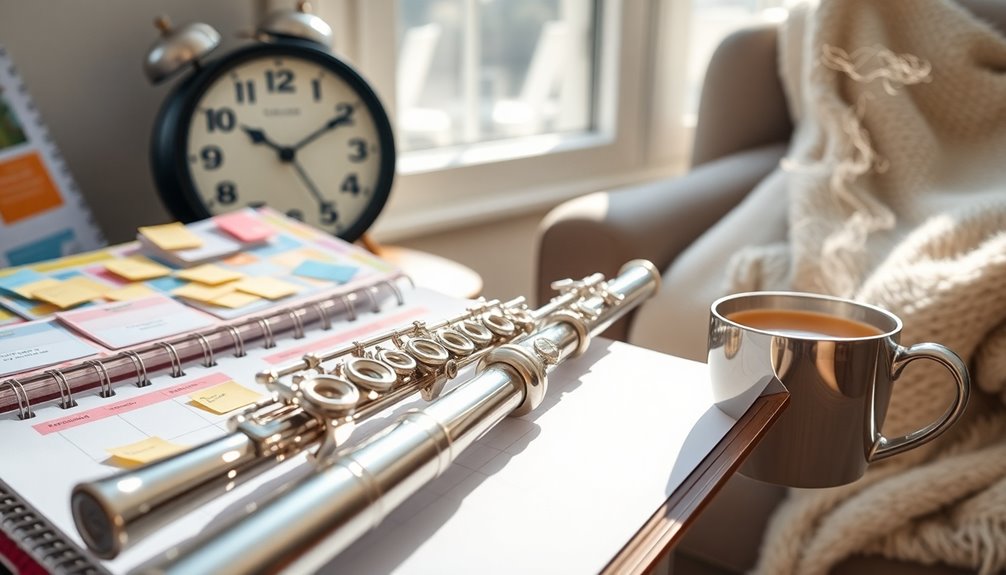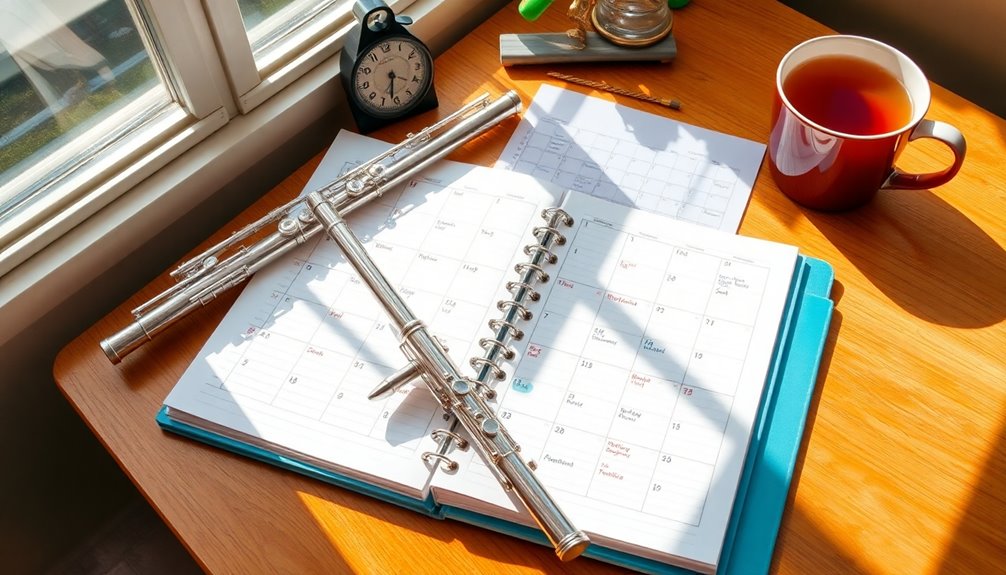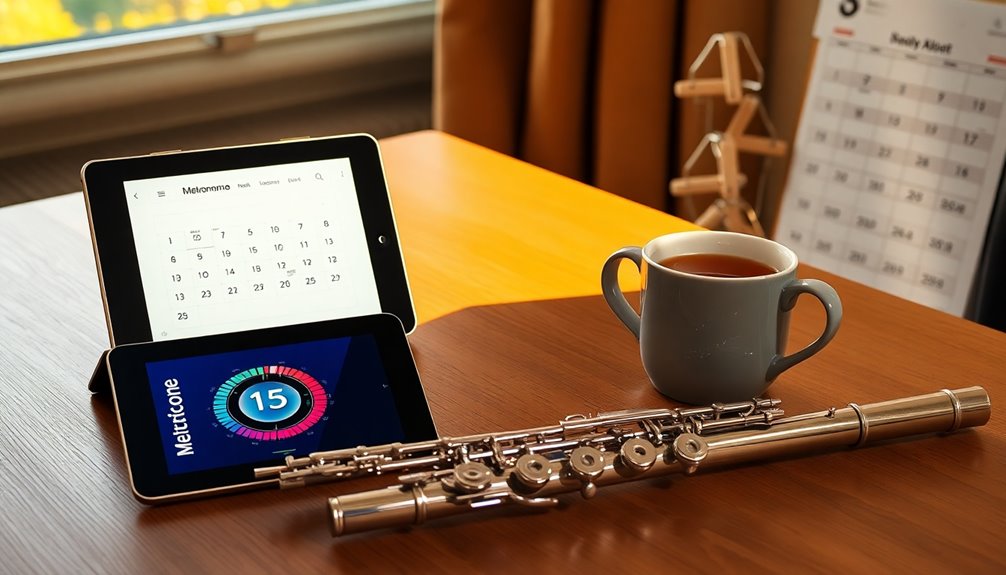Balancing flute practice with a busy schedule starts by evaluating your current commitments. Identify non-essential activities and prioritize flute time as a must-do appointment. Set clear, achievable goals and break them into smaller tasks. Utilize micro practice sessions of just 5-10 minutes throughout your day. Stay flexible and integrate practice into daily life; even while waiting or commuting, you can work on scales or breathing techniques. Leverage technology like practice trackers and apps to enhance your sessions. With this structured approach, you can make meaningful progress, and there's more that can inspire your journey ahead.
Key Takeaways
- Prioritize flute practice by blocking out dedicated time slots in your weekly calendar, treating them as unmissable appointments.
- Incorporate short, consistent practice sessions of 5-10 minutes throughout the day for effective time management.
- Set clear, achievable goals and break them down into smaller, manageable steps to maintain focus and motivation.
- Use practice tracker apps to log time and set specific goals, helping to stay organized and accountable.
- Reflect on your progress regularly and seek feedback from peers or teachers to enhance your practice routine.
Assess Your Current Schedule

To effectively balance your flute practice with a busy schedule, you first need to assess your current commitments. Start by listing all your daily and weekly activities. This schedule evaluation reveals where your time goes and helps you identify pockets of free time.
Be honest about how much time you genuinely spend on each activity; you might find you're spending more time on social media or TV than you realized.
Next, prioritize your commitments. Ask yourself what truly matters to you. Are there activities you could scale back or eliminate? This isn't about sacrificing joy but rather about making room for your passion for flute playing.
Effective time management means making intentional choices that align with your goals. Additionally, consider integrating regular maintenance of your flute into your practice schedule, as it ensures instrument longevity and sound quality.
Once you've identified your priorities, block out specific time slots for flute practice. Treat these slots as unmissable appointments, just like work or family events.
Consistency is key, and by sticking to this scheduled practice time, you'll develop a routine that feels natural and rewarding.
Set Clear Goals

Setting clear goals for your flute practice can greatly enhance your progress and motivation. When you engage in effective goal setting, you create a roadmap that keeps you focused and accountable.
Start by identifying what you want to achieve, whether it's mastering a specific piece, improving your technique, or preparing for a performance.
Break your larger goals into smaller, actionable steps. This makes them less overwhelming and more achievable. For instance, if your goal is to learn a new piece, set a target to practice a few measures each day.
Incorporate motivation techniques to keep your spirits high. Consider rewarding yourself when you reach these milestones, like treating yourself to a favorite snack or enjoying a fun activity with friends.
Also, share your goals with fellow flute players or a supportive community. This not only fosters accountability but also creates a sense of belonging. Additionally, focusing on scales and arpeggios can provide a structured approach to achieving technical proficiency within your practice goals.
Prioritize Practice Time

Finding time to practice the flute amidst a busy schedule is essential for your growth as a musician. To make the most of your practice time, prioritize it just like any other significant commitment.
Start by carving out dedicated slots in your weekly calendar specifically for flute practice. Treat these sessions as unmissable appointments for your development.
Next, focus on your flute techniques during these practice periods. You're not just aiming to fill time; you're working to improve specific skills. Whether it's mastering scales, improving your breath control, or refining your tone, be intentional about what you want to achieve.
Time management plays a vital role here. Use a timer to create focused practice intervals, allowing you to stay engaged without feeling overwhelmed.
Even short, consistent sessions can yield significant results over time. Additionally, consider incorporating essential flute practice tools that can enhance your efficiency during these sessions.
Break It Down

Breaking your practice into manageable segments can greatly enhance your progress on the flute. Instead of dedicating long, uninterrupted hours, focus on shorter, focused sessions. This approach aligns with effective time management and allows you to absorb new practice techniques more thoroughly.
Start by identifying key areas you want to improve—be it scales, breath control, or a specific piece. Allocate 10 to 15 minutes for each segment. This not only makes your goals feel more achievable but also keeps your motivation high.
During each segment, concentrate solely on one aspect of your practice. Use a metronome to maintain tempo, or record yourself to track progress. This focused approach helps you develop a deeper understanding of what you're working on, making each session feel rewarding. Additionally, mastering breath control is crucial for sustaining phrases and dynamics, enhancing your overall performance.
Utilize Small Time Blocks

You can make significant progress on the flute by utilizing small time blocks throughout your day. Instead of waiting for lengthy practice sessions, embrace micro practice. These short, focused sessions can be as little as five to ten minutes and can fit seamlessly into your routine.
Whether you're waiting for an appointment or taking a break at work, pull out your flute and tackle a specific skill or piece.
Identify a few key areas you want to improve, such as scales, breath control, or rhythmic exercises. During each micro practice session, concentrate solely on one goal. This targeted approach not only keeps you engaged but also fosters a sense of accomplishment with each completed session.
Consider using a timer to stay committed to your practice, as integrating metronome practice can help enhance your timing and rhythm accuracy. By setting aside these small moments for focused practice, you'll find that progress accumulates quickly, keeping your motivation high.
Create a Practice Routine

Establishing a consistent practice routine is essential for making the most of your flute playing, especially amidst a busy schedule.
By creating a structured plan, you'll not only maximize your practice time but also develop your skills more effectively. Here are some tips to help you set up your routine:
- Set Clear Goals: Define what you want to achieve in each session, whether it's mastering a piece or improving specific practice techniques.
- Designate a Time: Choose a specific time each day for practice, even if it's just for 15-30 minutes. Consistency is key!
- Incorporate Effective Warm Ups: Start each session with warm-ups to prepare your body and mind. This will enhance your performance.
- Mix It Up: Include a variety of activities in your routine, such as scales, etudes, and repertoire, to keep things fresh and engaging.
- Track Your Progress: Keep a practice journal to note what you worked on and any breakthroughs or challenges you encountered. Additionally, consider using online tutorials to supplement your practice and learn at your own pace.
Stay Flexible

Life can be unpredictable, and sometimes your carefully crafted practice routine needs a little adjustment. Embracing an adaptable mindset is essential when juggling flute practice with your busy schedule. Instead of feeling frustrated when plans change, view these moments as opportunities for spontaneous sessions.
You might discover that a quick ten-minute practice between commitments can be just as effective as an hour-long session.
To stay flexible, regularly assess your week and identify pockets of time that may open up unexpectedly. Instead of clinging to a rigid schedule, allow yourself to shift your practice into those moments.
Whether it's playing a few scales on your lunch break or working on a challenging passage during a waiting period, these spontaneous sessions can keep your skills sharp and your passion alive. Incorporating structured daily practice into your routine can help maximize these shorter sessions.
Use Technology to Help

Many flutists find that technology can be a game-changer in their practice routines. By incorporating mobile apps and online resources, you can enhance your practice sessions even with a busy schedule.
Here are some tools that can make a difference:
- Practice Tracker: Use an app to log your practice time and set goals.
- Virtual Metronome: Keep your timing sharp with a metronome app right on your phone.
- Recording Software: Record your sessions to analyze your progress and identify areas for improvement.
- Video Tutorials: Learn new techniques and pieces through engaging video lessons available online.
- Digital Sheet Music: Access a wide range of music notation on-the-go to stay inspired.
These resources not only make practice more efficient but also create a sense of community. You can share your recordings, join online lessons, and connect with fellow flutists. Moreover, consider investing in quality tools like flute tuners and metronomes to further refine your skills and ensure precision in your playing.
Embrace technology as a partner in your musical journey, and you'll find that your practice becomes more effective and enjoyable. With these tools at your fingertips, you'll feel more connected and motivated to keep advancing your flute skills.
Incorporate Practice Into Daily Life

Finding time to practice flute amidst a busy day can feel challenging, but integrating your practice into daily routines can make it more manageable. Start by identifying mindful moments throughout your day—those small pockets of time that you can dedicate to your flute. This might be during your morning coffee, on your commute, or even while waiting for an appointment.
Consider creative integration of your practice. For example, you can play simple warm-ups while you cook or use your lunch break to run through scales. This doesn't just help you practice; it also transforms everyday activities into opportunities for growth. Remember that using a flute made of nickel silver can enhance playability and durability during these short practice sessions.
If you have kids, involve them in your practice. They might enjoy creating rhythms or melodies alongside you, making it a fun family activity.
Additionally, set short, achievable goals for these moments. Instead of aiming for a full practice session, focus on mastering a few measures of a piece or improving your breath control. Celebrate these small victories!
Reflect and Adjust

As you navigate your busy schedule, it's essential to periodically reflect on your practice routine and adjust it as needed. This mindful reflection not only helps you assess your progress but also fosters self-awareness techniques that can enhance your flute playing.
Taking time to evaluate your current practice can lead to more effective sessions and greater satisfaction.
Here are some tips to guide your reflection:
- Set specific goals: Identify what you want to achieve in your practice sessions.
- Track your progress: Keep a journal or log to monitor your improvements and challenges.
- Assess time management: Consider if you're allocating enough time to practice amid other commitments.
- Seek feedback: Ask a teacher or fellow musician for constructive criticism to gain fresh perspectives.
- Be flexible: Don't hesitate to change your routine if something isn't working; adaptability is key. Additionally, incorporating structured practice can significantly enhance your effectiveness and skill development.
Frequently Asked Questions
How Can I Stay Motivated to Practice Regularly?
Staying motivated to practice regularly can be a challenge, but setting clear goals is key.
Break your larger goals into smaller, achievable milestones. Celebrate each small victory with practice rewards, like enjoying a favorite treat or taking a break to do something you love.
Surround yourself with supportive friends or fellow musicians; their encouragement can boost your motivation.
What if I Miss a Scheduled Practice Session?
Missing a scheduled practice session can feel like a ship drifting off course, but it doesn't mean you're lost!
Use alternative practice techniques, like shorter sessions or focused warm-ups, to stay connected. Rescheduling can also work wonders; simply find a new time that fits your day.
How Do I Handle Distractions During Practice?
Handling distractions during practice is essential for your progress. Start by employing distraction techniques—like turning off your phone or finding a quiet space.
Use focus strategies, such as setting specific goals for each session. Break your practice into manageable chunks, allowing for short breaks to recharge.
Can I Practice Without a Flute?
Imagine standing in a serene park, the sun warming your face, as you practice your flute mentally. Yes, you can practice without a flute!
Focus on air flute techniques, where you visualize finger placements and play in your mind. This mental practice sharpens your skills, ensuring you feel connected to your instrument even when it's not in hand.
Embrace this time; it's a powerful way to grow as a musician while feeling a sense of belonging.
What Are Some Effective Warm-Up Exercises for Flutists?
Effective warm-up exercises for flutists include long tones and scale exercises.
Start with long tones, focusing on breath control and tone quality; hold each note for 4-8 beats.
Next, move on to scale exercises in various keys, playing slowly to guarantee accuracy.
This structured approach not only prepares your instrument but also builds your confidence.
Conclusion
Balancing flute practice with a busy schedule may feel like juggling flaming torches, but it's possible with the right approach. By evaluating your time, setting clear goals, and incorporating practice into your daily routine, you can keep your musical flame alive. Remember, even small practice sessions can spark growth. Stay flexible and let technology be your ally. Embrace the rhythm of life, and you'll find harmony between your passion and your responsibilities. Keep playing; your melody matters!






